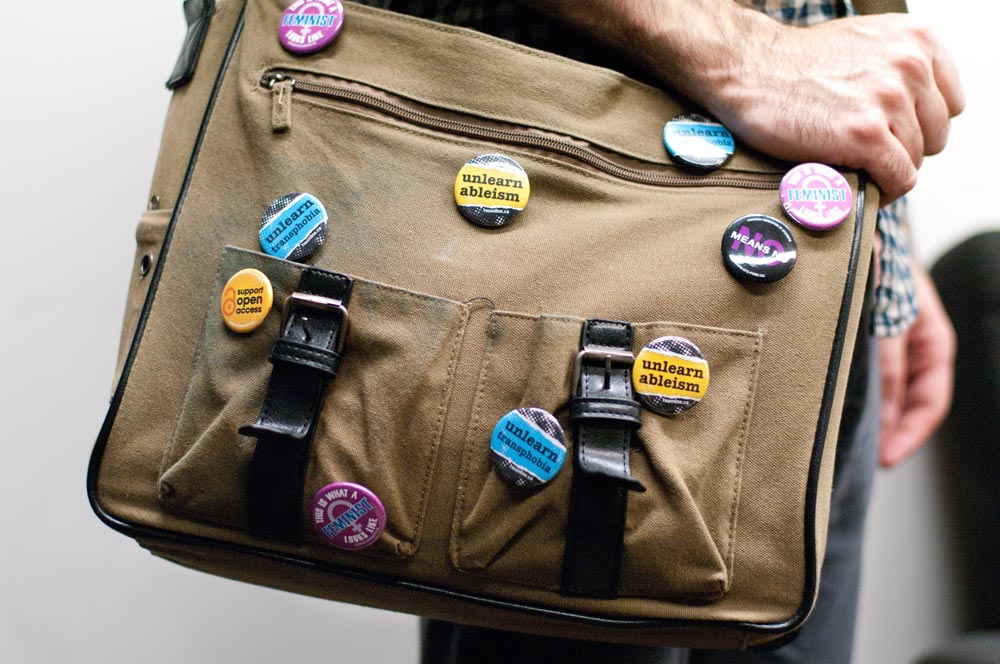When it comes to application numbers, personal style and professional programs, Ryerson can’t be beat. But when it comes to spreading anti-oppression principles, Ryerson is outpaced and outclassed. Arts & Life Editor Allyssia Alleyne finds out how Ryerson stacks up
Rodney Diverlus is an equity geek. If you come to his office to discuss, say, queer rights or the marginalization of Aboriginal peoples, he could go on for hours. If you want resources about women’s rights or racialized communities, he’ll point you in the right direction.
As vice-president equity at the Ryerson Students’ Union (RSU), it’s his job to help create a campus where everyone operates under an anti-oppression framework.
“[Anti-oppression] essentially means that you’re thinking about inequities. We acknowledge that different students have different needs and different barriers,” he explains. These inequities include gender, sexuality, race and ability.
But while Ryerson may be leading the pack in some areas, it’s trailing behind its neighbouring universities when it comes to promoting anti-oppressive ideals.
Diverlus says the equity service groups should be a student’s first resort if they want to learn about various issues from an anti-oppressive framework, but cisgendered men (men whose biological sex matches their gender identity) who want to learn more about feminism may be intimidated by a sign outside of Ryerson’s Women’s Centre.
Among the pro-choice and feminist movement posters is one letter-sized piece of paper stating: “STOP To ALL Male Allies.” Men must knock before entering because their presence may make women uncomfortable, and can be asked to leave at any point.
Sabera Esufali, who has been the coordinator at the University of Toronto’s Centre for Women and Trans People for the last three years, thinks this policy might send the wrong message, even if it is well-intentioned.
“How do you police a space?” Esufali asks. “How do you monitor a space for gender when a lot of the work that we do focuses on breaking gender norms?”
At The Centre for Women and Trans People, both cisgendered and trans men are allowed to drop in at their leisure, as well as volunteer or participate in group activities. They even have a male work-study student.
“If men feel like they want to be in the space and work towards our philosophies under our mandate, then that’s great.”
Diverlus says the RSU has been making an effort to educate everyone who works with them so that they have a comprehensive understanding of the inequities they are trying to address.
Last summer they worked with Ryerson’s Office of Discrimination and Harassment Prevention Services and consulted with other universities, including York University and the University of Toronto, to create an anti-oppression training module for orientation leaders and equity service group coordinators. (“Orientation leaders can set the stage for what we expect of ourselves,” Diverlus reasons.) This year about 500 people participated. The training was three hours long, but according to Diverlus, “it just scratched the surface of anti-oppressive principles.”
“I think Ryerson is getting into a place where coming from an anti-oppressive framework is being normalized, but we’re definitely not York,” he explains. “They have models and modules that are very admirable. They’ve set the stage.”
Siva Vimalachandran, the vice-president of equity for the York Federation of Students (YFS), doesn’t know if they’ve necessarily “set the stage,” but he can understand where Diverlus is coming from.
“Our membership at York is very aware and very committed to making sure our campus is a positive space,” he says. The school is known for its campaigns around subjects like islamophobia, as well as its high-profile speakers. When political activist Angela Davis spoke at the university in 2010, 600 people attended.
“All of the speaker series are always packed,” he says.
Like Ryerson, York offers anti-oppression training for YFS staff and orientation week leaders (about 800 this year), but they’ve also provided training for security personnel, student club executives, YFS volunteers, people who work in their student centre, and students who are leaders in other avenues among others.
But even if they have different approaches to promoting an anti-oppression mind-set, Diverlus, Esufali and Vimalachandran all agree that they still have a lot more to do before their work becomes unnecessary. Esufali still has students of colour coming to her with stories about how a Eurocentric curriculum is negatively impacting their education. Vimalachandran is still trying to find ways to get his message across to York’s approximately 50,000 students.
“People’s identities still matter. People’s identities still either push them forward or pull them back,” says Diverlus. “It’s as easy as just opening your eyes and seeing we’re not there yet.”













Leave a Reply